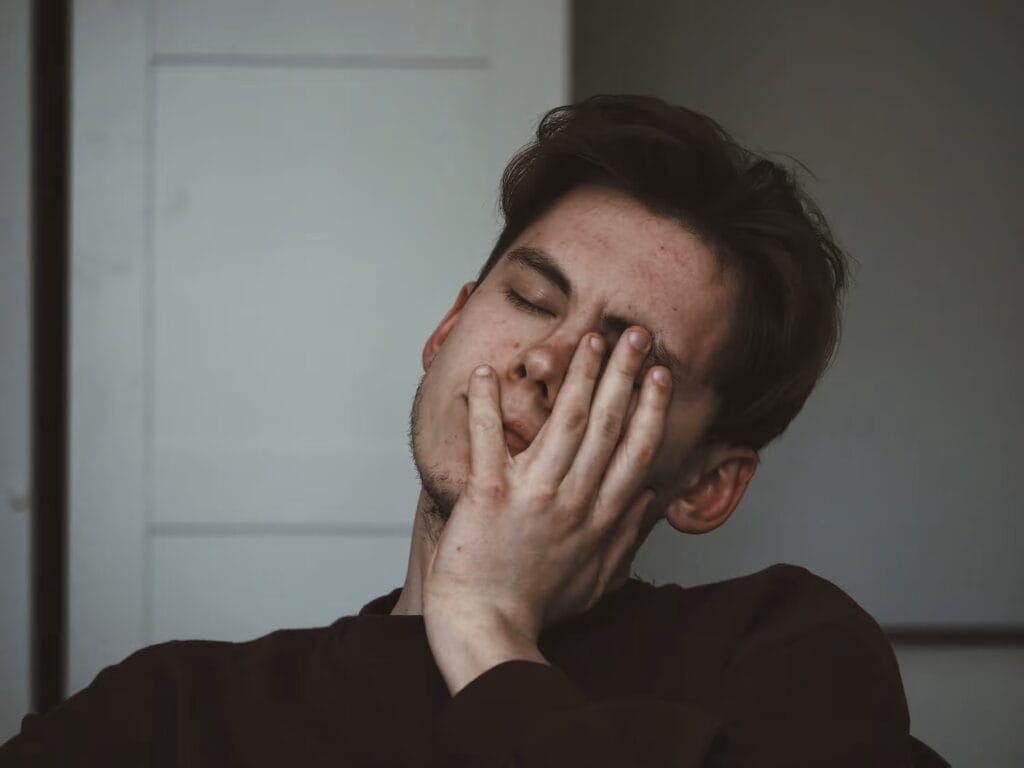
If you feel totally wiped out during hayfever season, you’re not imagining it. That heavy tiredness, foggy thinking and lack of focus? It’s a real thing and there is science to back it up.
Hayfever (allergic rhinitis) isn’t just about sneezing and itchy eyes. It can affect your energy, your brain, your sleep, your mood and even your performance at work or school. If you’ve ever wondered “can hayfever make you tired?” — the short answer is yes. And here’s why.
Why Hayfever Makes You So Tired
When your body reacts to pollen, it kicks off an immune response. That’s your body mistakenly thinking pollen is harmful. It releases histamine and other chemicals that cause inflammation — and that inflammation doesn’t just affect your nose. It affects your whole body and brain.
This can lead to:
- Brain fog – Trouble thinking clearly or remembering things
- Low energy – Feeling like you’ve got the flu (but without the fever)
- Slow thinking – Taking longer to make decisions or respond
So if you’ve been asking, “can hayfever make you tired enough to struggle with your daily routine?” — yes, it absolutely can.
One study [4] looked at young people trying to learn new information during pollen season. Those with hayfever — especially if taking drowsy antihistamines — struggled more than those without allergies.
Another group of researchers [5] found that hayfever sufferers made slower decisions and had trouble concentrating during allergy season. Not ideal if you’ve got exams, work deadlines, or just want to feel like yourself again.
School Struggles Are Real
If you’re a student or parent, this one’s important.
In the UK, GCSE exams happen right in the middle of grass pollen season. One study [6] showed that students with hayfever during exams were 40% more likely to get lower grades than their classmates. If they took sedating antihistamines, the risk of poor grades jumped to 70%.
A Swedish study [7] backed this up. Students without allergies improved their grades from autumn to spring. But those with pollen allergies saw their marks drop — or barely improve. They also felt more stressed and enjoyed school less.
Another survey [8] found that one in four high school students had problems caused by hayfever. They felt tired, less confident, and thought their teachers didn’t understand what they were going through.
And it’s not just about grades. Teenagers with hayfever said their sleep, friendships, physical activity and self-esteem were all affected compared to their peers without allergies.
So next time you’re wondering “can hayfever make you tired enough to affect your academic performance?” — it’s a clear yes.
✔ Poor Sleep = Next-Day Wipeout
If you’re tossing and turning at night, hayfever might be the reason.
Blocked noses get worse when you lie down. Some children with hayfever even have snoring or sleep apnoea. Interrupted sleep makes it harder to function the next day — especially for kids and teens trying to concentrate in class.
Studies show:
- Hayfever sufferers take longer to fall asleep [10]
- 78% of allergic teens report poor sleep [11]
- Most wake up during the night and feel groggy the next day
This all feeds into the bigger question: can hayfever make you tired during the day by ruining your sleep at night? Definitely.
✔ What About Behaviour and Mood?
There’s growing evidence that hayfever can also affect behaviour — especially in kids.
In young children with hayfever, things like constant sniffling and tiredness can lead to irritability and behavioural issues.
One study [12] found that many children diagnosed with ADHD actually had signs of undiagnosed allergic rhinitis.
Hayfever has also been linked to higher rates of anxiety and depression in adults [13].
It’s not that allergies directly cause these conditions — but the tiredness, poor sleep, and constant discomfort can mimic or worsen mental health and behavioural symptoms.
So when parents or teachers ask “can hayfever make you tired enough to change behaviour?” — the answer is yes, and it can have a knock-on effect on mood and mental wellbeing.
Hayfever Affects Adults at Work Too
Hayfever doesn’t clock out when you go to work. It can affect productivity, concentration, and performance.
One study [15] found hayfever reduced work productivity by 23%, even though people rarely took sick days.
Compared to asthma, hayfever sufferers were actually more likely to show up to work — but perform worse.
91% of workers with hayfever said their symptoms affected their ability to do their job.
And if you’re not treating your hayfever? That’s linked to a 10% drop in work capacity compared to people without symptoms [1].
When employees quietly ask themselves “can hayfever make you tired and less effective at work?” — the evidence says yes, and it’s a common problem.
The Big Picture: It’s Not Just “A Bit of Hayfever”
It’s easy to underestimate hayfever — but for many people, it’s a serious condition that affects daily life. It can:
- Disrupt your sleep
- Drain your energy
- Slow down your brain
- Affect your performance at school or work
- Lower your confidence and mood
- Make you feel miserable and misunderstood
The good news? Treatment works — especially when it’s tailored to your symptoms and lifestyle.
What You Can Do About It
- Switch to non-drowsy antihistamines (like loratadine, cetirizine, or fexofenadine)
- Use a steroid nasal spray daily to reduce inflammation
- Try saline rinses to clear pollen from your nose
- Avoid pollen exposure: shower after being outdoors, keep windows shut at high pollen times
- For severe symptoms, consider a Kenalog steroid injection — it can offer relief for 6–8 weeks
- Speak to a GP to rule out other causes of tiredness like low iron, thyroid issues, or vitamin deficiencies
If you’re still asking yourself “can hayfever make you tired — and is it fixable?” The answer is yes, and yes.
Don’t let hayfever hijack your life.
If you’re constantly tired, foggy, or struggling to cope during allergy season, we’re here to help.
Book a same-day appointment at OneMedicine and get personalised treatment — fast.
References
- Allergy 2007; 62:1022–1031
- Vuurman EF, et al. Br J Clin Pharmacol. 1993
- Marshall PS, et al. Ann Allergy Asthma Immunol. 2000
- Walker S, et al. J Allergy Clin Immunol. 2007
- Mannerfeldt K, Pettersson R. Stockholm University
- Swedish National Allergy Survey, 2004
- Allergy 2004; 59:1300–1306
- Leger D, et al. Allergy 2006
- Juniper EF, et al. Qual Life Res. 1999
- Brawley L, et al. J Child Neurol. 2004
- Cuffel B, et al. Psychosomatics. 1999
- Allergy 2003; 58:1117–1123
- Reilly MC, et al. Allergy 1996
















